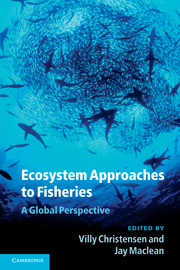Book contents
- Frontmatter
- Contents
- List of contributors
- Foreword
- Preface
- Acknowledgments
- 1 Introduction: toward ecosystem-based management of fisheries
- I Life in the oceans
- II Evaluating impact on marine life
- III Managing living resources
- IV The human side
- 13 Science and capacity building for sustainable development in fisheries
- 14 Thinking big on small-scale fisheries
- 15 Coastal-marine resource use in human ecological context: the scale and modes of integration
- 16 Global fisheries economic analysis
- V Impacting policy
- Index
- References
15 - Coastal-marine resource use in human ecological context: the scale and modes of integration
Published online by Cambridge University Press: 05 June 2012
- Frontmatter
- Contents
- List of contributors
- Foreword
- Preface
- Acknowledgments
- 1 Introduction: toward ecosystem-based management of fisheries
- I Life in the oceans
- II Evaluating impact on marine life
- III Managing living resources
- IV The human side
- 13 Science and capacity building for sustainable development in fisheries
- 14 Thinking big on small-scale fisheries
- 15 Coastal-marine resource use in human ecological context: the scale and modes of integration
- 16 Global fisheries economic analysis
- V Impacting policy
- Index
- References
Summary
INTRODUCTION
Here I examine some ideas based on Daniel Pauly's various forays into coastal zone resources use, and, in particular, Malthusian overfishing, a contribution that will probably always be a work in progress. Ignoring the admonition “Here be Dragons,” Daniel Pauly sowed the seed, and then essentially left it to others to take it from there. Much of the later discussion about Malthusian overfishing has been rather narrowly focused. But in this chapter, I will elaborate on aspects of integrated resource use and management. This is both explicit and implicit through much of the work of Daniel Pauly. And by design it often leads us far from the ocean and seas, where his main work lies, into the linked hinterlands of mountains and farming, and down the corridors of ministries, fisheries departments, development agencies, and donors.
The basic characteristics of Malthusian overfishing were described by Pauly (1988, 1994a, 2006) as occurring where (1) a relatively large agricultural sector releases excess labor because of both population growth and land “reform,” which (2) then migrates to urban, upland, coastal, or other areas. In coastal areas (3) under this influx, traditional arrangements preventing open access to the fisheries gradually collapse, which then (4) leads to excessive fishing pressure, that itself is (5) exacerbated by inshore industrial fishing, by new recruits to fishing as the male children of fishers pick up their fathers' trade, and by the contribution of many young people who leave to work in urban areas or overseas, providing a subsidy for men to continue to fish, even when resources are depleted.
- Type
- Chapter
- Information
- Ecosystem Approaches to FisheriesA Global Perspective, pp. 241 - 271Publisher: Cambridge University PressPrint publication year: 2011
References
- 2
- Cited by



